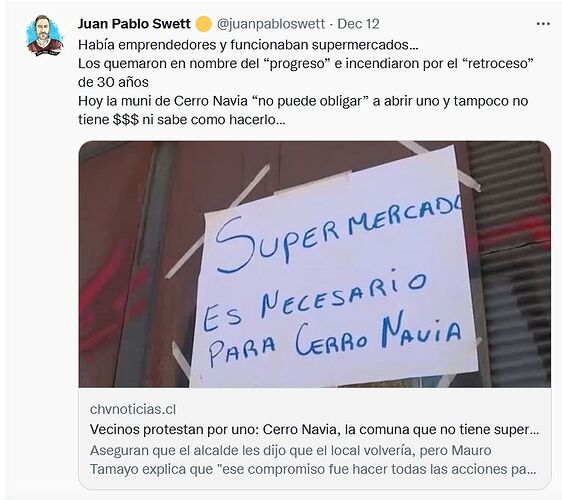Hi, I fully agree with your recommendation to stock up, it’s good common sense, but I actually don’t think there will be major disruption. Of course, I may be wrong, but here’s my thinking.
If Kast wins, an immediate protest is a protest against not politicians but against democracy, against the people that voted for Kast, and maybe the people that didn’t vote. Will people really take to the streets to protest against the people? I think not many. Let’s not protest against Kast until he does something that is an overreach of powers, or that wasn’t in his program, or is against the will of the Chilean people or the congress.
The big celebration after the constitution vote was a celebration of a people’s victory, not that of a politician.
If Boric wins, it’s not going to lead to a large celebration of that sort, because people don’t like to celebrate politician’s individual victories. If Boric wins, it’s not because he’s truly loved by many, but because enough people will have decided he is a bit better than the other guy, the least bad option, an anti-Kast vote, or worth giving a chance. The Boric fans are, I suspect, more likely the homemade placard type of protester rather than the throw rocks at military type of “protestor”. That latter sort are either communist, Lista del Pueblo, or apolitical. Of course, if Boric’s celebration is big enough, it will attract criminals and looters as any large enough protest does. But I don’t think it will get big enough.
The other thing is that the population at large, the ones that swelled the October 25th 2019 to over a million, are not as passionate at the moment. Some apathy has come back. The radio debate may have fuelled this sentiment a bit, especially given that the majority of people didn’t listen to a largely reasonable debate, but perhaps saw in the news or social media later the argumentative part that Boric and Kast had. I think that kind of thing is a turn off for the people.
I also think whatever happens will probably be over by Sunday. It may even be that almost nothing happens.
I would add that my predictions are for the country as a whole. For Plaza Italia, Valpo and maybe San Antonio, I’m less confident, it seems that there is more unpredictability/volatility. But for the rest of the country, I would be surprised if things get messy and are still messy by Sunday.


